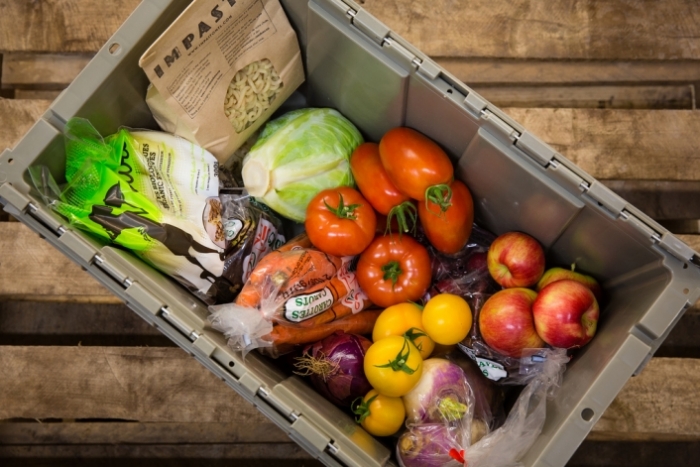Lufa Farms, a Montreal urban agriculture company, is working on revolutionizing the city’s food system, based on two key ideas: Growing food where people live and growing it more sustainability. Best described as an online farmer’s market, Lufa Farms operates three rooftop greenhouses in Montreal, which produce more than 100 types of vegetables annually. Fresh produce is delivered the same day that it’s harvested and is supplemented by the company’s partners (including Ferme La Rose des Vents, Fromagerie du Vieux St-François, Aux Vivres, and others) who provide sustainably and humanely-raised meats, as well as dairy, eggs, baked goods, pastas, vegan alternatives, and more. Lufa Farms’ unique focus on both taste and sustainability allows customers to reconnect with their food.
Customers can complete an easy sign-up online, customize their personal basket of food, and pick it up at one of the 450 pickup points scattered throughout Montreal. Vegetables are harvested overnight and delivered the following afternoon at the customer’s preferred location.
Fortunately for McGill students, Lufa Farms makes buying locally-sourced food affordable. The minimum basket order is $15, but Thibault Sorret, a Lufa Farms employee, said in an interview with the The McGill Tribune that many students may supplement their normal grocery shopping with Lufa Farms’ vegetables.
“Most students use Lufa Farms as a vegetable complement to [their] normal grocery shopping,” Sorret said. “[First they] chose a base, like quinoa or rice, then add vegetables, which are the best and cheapest pesticide-free vegetables in Montreal, and finish with protein.”
The primary goal of local agriculture is to produce good taste, not durability for transport or yield capabilities, so Lufa Farms hopes to show consumers the value difference and importance of food grown close to home.
“If you use this approach, you will eat healthier, but you will be able to adjust [shopping at Lufa Farms] to your budget,” Sorret said. “[Hopefully] the more people who develop a connection to their food, the more people will question why supermarket food [lacks the same quality of taste.]”
Lufa Farms prides itself on using no new land, meaning that their hydroponic greenhouse systems—employing agriculture that produces crops without soil—are exclusively on the rooftops of existing buildings. All greenhouses use a closed circuit water system, which collects rainwater, snowmelt, and recycles 100 per cent of gray water and waste water from the agricultural process. Lufa Farms also uses biocontrols—instead of pesticides—for their crops, and organic waste is composted on-site. Lufa Farms’ innovative technology represents a switch back to localized agriculture.
In the next two years, the company hopes to expand to the United States and gain attention internationally. Urban agriculture is a relatively new field, with the potential to revolutionize the way we think about food production. The company’s greatest expenses are the construction and maintenance of its rooftop greenhouses, but as Lufa Farms expands, they will reduce the costs of their products, making the Lufa Farms choice an even more economically-accessible option. According to Sorret, Lufa Farms’ current success demonstrates that if cities take advantage of their unused rooftop space, they have the potential to create largely self-sustainable food production systems.
“Rooftop farms on only just 19 rooftops of large malls could feed the entire city, even in cities, like Montreal, with challenging climates,” Sorret said.
The company hopes to cater to customers living on and near the island of Montreal with fresh and local foods that are sustainably produced.
Montreal might not often be considered an agricultural city, with long winters that bring bone-chilling temperatures and unsightly amounts of snow. The city’s bizzare seasonality has restricted Montrealers’ food choices to often tasteless and subpar quality produce which has travelled thousands of miles, just to be selected begrudgingly from the aisles of the local supermarket. This leaves urban agriculture, and companies like Lufa Farms, as the first stepping stone to a more sustainable future for the city.









